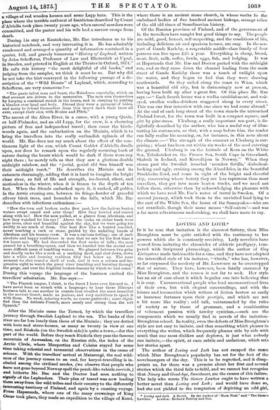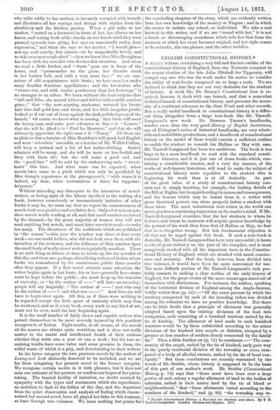LOVING AND LOTH.*
IF it be true that imitation is the sincerest flattery, then Miss Broughton must be quite satisfied with the testimony to her powers which she is constantly receiving. Lady novelists have ceased from imitating the chronicles of athletic profligacy, tem- pered with Scriptural phraseology, which the author of Guy Livingstone made fashionable fora time, and they have not adopted the intensified style of his imitator, " Ouida," who has, however, as far surpassed the modesty of Mr. Lawrence as he overstepped that of nature. They have, however, been fatally ensnared by Miss Broughton, and the reason is not far to seek. Her style has an air of ease about it which beguiles one into believing that it is easy. Unconventional people who lead unconventional lives of their own, but with elegant surroundings, and with the leisure and locomotion which writers of fiction bestow as easily as immense fortunes upon their protégés, and which are not a bit more like reality ; odd talk, untrammeled by the rules of society as by those of grammar, and a combination of vehement passion with tawdry cynicism,—such are the components which we usually find in novels of the imitation- Broughton school. In reality, even the defects of Miss Broughton's style are not easy to imitate, and that something which pleases in everything she writes, which frequently pleases side by side with much that one most dislikes and deplores, is just what nobody can imitate,—the spirit, at once subtle and audacious, which sets her stories apart.
The author of Loving and Loth has not escaped the snare which Miss Broughton's popularity has set for the feet of the novelmongers of the day. This is to be regretted, and it disap- points us, for there was a promise about her first and second stories which the third fails to fulfil, and we cannot but recognise that Nancy and Good-bye, Sweetheart, are the causes of this failure. The lady who wrote The Sisters Lawless ought to have written a better novel than Loving and Loth; and would have done so, had she not yielded to the temptation of depicting an odd girl, * Loring and Loth. A Novel. By the Auihor of "Boss Noel" mad "The Sisters Lawless." London: Richard Bentley and Son. who talks oddly to her mother, is intensely occupied with herself, and illustrates all her sayings and doings with similes from the shrubbery and the kitchen garden. When a girl talks to her mother, "seated on a footstool in front of her, her elbows on her knees, and resting both white cheeks on her hands until they were pressed upwards into giving her eyes an unnaturally crafty, foxy expression," and when she says to her mother, "I would give— not my soul exactly, but almost—to be unspeakably lovely, and to ride over men rough-shod "—then we know that Miss Broughton has been with the novelist who devises this situation. And when we read a little farther, and " Susie " goes out in front of the house, and "promenades on the grass, her thumbs stuck in her leather belt, and with a very cross face :" we are con- scious of old acquaintance with Susie ; we have seen her under many familiar feminine appellations ; and the fox-terrier who "comes out, and with canine persistency dogs her footsteps," is no stranger to us either. We learn without the least surprise that "tall and lithe, she moved hither and thither with a swift, careless grace ;" that "the now-starting sunbeams warmed her brown hair into dull gold here and there, and her little irregular profile looked as if cut out of ivory against the dark polished green of the laurels." Of course we know what is coming : that Susie will meet the wrong man, and make pert advances to him It /a "Lenore," that she will be jilted it la "Paul Le Mesurier," and that she will ultimately appreciate the right man it la "Nancy." All these are as plain as that a heroine of Miss Braddon's will speak bad English and wear ' cabochon ' emeralds, or a heroine of Mr. Wilkie Coffins, will keep a journal and a list of her under-clothing. Susie's admirers will be many, and she will be more or less foolish and flirty with them all ; but she will make a good end, and the " good-bye " will be said by the undeserving male "sweet- heart" this time. And what more can be expected, when novels have come to a pitch which can only be paralleled by Mrs. Gamp's experience at the greengrocer's, " wich warm it is indeed, my dear, when cowcumbers is three for tuppence- ha'penny."
Without intending any disrespect to the intentions of novel- writers, or losing sight of the labour involved in the writing of a book, however consciously or unconsciously imitative of other books it may be, we must say that we regret the numerousness of novels both as a positive and a relative fact. Onlya few writers pro- duce novels worth reading at all, and that small number are forced by the demand—by the great majority of women who will not read anything but novels, and must have novels to read—to write too many. The dreariness of the multitude which are published in "the season"—this year the number was three or four every week—no one could believe, who did not look over them with the intention of the reviewer, and the influence of their number upon the small body of really clever writers is painfully manifest. There is no such thing as leisure or time to touch-up for the novelist of this day, and there are, perhaps, three living writers of fiction whose books are remembered by the omnivorous public three months after they appear. If a first novel attracts some attention, the writer begins again in hot haste, his or her—generally her—name must be kept before the public ; she must keep up the stimulus of curiosity, or "by the author of —" will have no meaning ; people will say languidly, "The author of —! and who may be the author of — ? and what was —? " And then she will have to begin over again. All this, as if there were nothing to be regarded except the little spurt of curiosity which may thus be awakened, and as if every book, every work in any kind of art, must not be ever, until the last, beginning again.
It is the small number of fairly clever and capable writers who permit themselves to be most severely injured by this pestilent overgrowth of fiction. Eight-tenths, at all events, of the novels of the season are always quite worthless, and it does not really matter to the moral and intellectual health of their authors whether they write one a year or one a week ; but the two re- maining tenths have some value and some promise in them, the wilful waste of which is a pity, and deteriorating to their writers.
In the latter category the two previous novels by the author of Loving and Loth distinctly deserved to be included, and we are far from relegating her present novel to the former category. We recognise certain merits in it with pleasure, but it does not raise our estimate of her powers, or confirm our hopes of her pains- taking. The fancied facility of imitation, no doubt assisted by sympathy with the types and sentiments which she reproduces ; an ambition to dash at the follies of the day, and the departure from the quiet observation and analysis of feeling which charac- terised her second novel, have all played her false in this instance, at least through two volumes. We have nothing but praise for
the concluding chapters of the story, which are evidently written from her own knowledge of the scenery at Niagara ; and in which she ceases to imitate any school, or individual. We take a real interest in this writer, and if we are "round with her," it is not a harsh or discouraging roundness which tells her that from the moment at which her story becomes original, and her style ceases to be mimetic, the one pleases, and the other satisfies.































 Previous page
Previous page